BRAMBILLA
By JULIAN BARNES
TELL YOU how I learned to descend. Mr Douglas, back then, used to tell me I rode like a postman. He had this old machine as well as his racer, stand-up handlebars, almost a shopping-basket on the front, and sometimes he'd go out on it with me. I thought he was just doing it to put me down, but he was a canny fellow, he was showing me how far I had to go. I mean, he wouldn't keep up with me all day, but he'd do it for a stretch, then send me off over the hills by myself. Uphill, downhill, story of my life.
So one day I thought training was over and he started towing me up Mount Moran. Just kept pedalling, mouth shut, setting the pace, with me in behind. We'd been out seven, eight hours already and the sun was turning all orange over the flats and I really didn't see the point because he wasn't hurting me, I was sitting on his back wheel and no problem. We'd gone up this whole load of big loops and he stops at the side of the road and we're looking into the sun and he says, 'Right, Andy, I'm going to teach you how to descend.' And — this is the scary bit — he takes out this little span- ner and unscrews his brake blocks and just hands them to me. 'All you have to do is keep up,' he says, 'and I'll buy the drinks.' So he pushes off while I'm stowing his blocks, and I had to follow him, and at first I thought, well, if he isn't using brakes I won't either, except by the second or third bend I was cramming them on and here's this little old geezer, this flying fucking postman, speeding down ahead of me, just using his body to slow himself down, sitting up in the saddle and then going into a crouch and using every inch of the road and sometimes I'd do a bend like him without the brakes and I'd let out a yell but he'd have his mouth shut all the way, Mr Douglas.
Once or twice I caught up with him but I always lost it on the bends and I was shit- scared to think about having this old Raleigh and no brakes. And at the same time I could see that if you could do it, if you could really do it, it would be like hav- ing a jump or whatever. The most exciting thing there was. And each time we went up Mount Moran he'd do the same, except he'd say I could use the brakes six times, and then five, and then four, and then in the end no brakes at all. And I'd follow that lovely old bastard on his granny bike and he'd always beat me but less and less each time. Then I'd buy the drinks, and he'd tell me how to live my life. One day he told me about Brambilla. And that's how I learned to descend.
* * *
I RAN away from home. No, the truth is, I was gone already, in my head, anyway. Of course they blamed Andy, but that's ridiculous. Andy was the first boy who always brought me home sharp at eight- thirty. He said from the beginning he had to be in bed by nine because nine was when Sean Kelly went to bed. You'd think they'd approve of that but they didn't. My dad thought there was something wrong about it. I said, Dad it makes a change from you waiting up after midnight with a shotgun. But he didn't think that was funny. He didn't get the point.
Yes, I suppose I did run away with Andy in their eyes. One day he said, I'm off to pedal my way round France for a living, want to come? I said what? He said, take the brakes off and just go whoosh. I said, whoosh? And he winked, and that was it. But I was never staying. It's not Andy's fault I don't live down the street with two kids, backache and afternoons in a shop if I'm lucky. They couldn't understand why I didn't want to listen to the seagulls over the bowling-green for the rest of my life. If they wanted that for me, they shouldn't have let me go to ballet. Home sweet home. My dad even suggested I should try bowls, the club could do with some new blood. I said, you mean like Dracula? They kept asking what Andy and I had in com- mon. I said, well, legs for a start.
We sat on the boat and looked out of the big back window. There was the usual flock of gulls but I somehow got the idea they were the ones from the bowling-green. I kept expecting them to turn back, but they didn't. There were probably other reasons as well but I started crying. Poor Andy didn't know what was happening. I said, they should have had enough by now. When he saw I was serious he went out on to the deck and I could see him swearing at the gulls and waving his fists. Of course they didn't take any notice, but it was very sweet. I dried my tears and gave him a kiss. I said something like, Who's my hero, and he said something like, I'm a hard man, doll. He's putting it on when he talks like that. Mostly. Then we both tried to ignore the fact that the gulls stayed with us, all the way to Calais. Never turned back.
* * * * THEY RESPECT us, you know. The anglophones, they call us. They know we're hard men, we haven't come all this way to throw in the towel. They still remember Tom Simpson as if it was yesterday. Did you know when he died in the Ventoux it was the thir- teenth day of the month and the thirteenth stage of the race? Makes you think, doesn't it? He's still a hero out there, the one who paid the ultimate price. Next day, they let Barry Hoban take the stage as a mark of respect. An Englishman winning on the qua- tone juillet. Barry Hoban married Tom Simpson's widow, did you know that? Sean Kelly, he's the iron man. He eats nails for breakfast. Did you hear about Sean Kelly in the Tour of Spain? He had • . . there's a medical name for it but I've forgotten, but basically it's a sort of ingrow- ing hair in your arse. They used to get it in the war, called it Jeep Arse, you got it from riding round on the hard seat of a jeep all day. It's the most painful thing there is, and it's only, you know, one of the hairs in your arse deciding to grow in rather than out. That's all it is, but you get this boil which hurts like hell, and the worst thing you can do if you've got it is ride a bike. You have to get it surgically treated and then you're sitting in a salt bath for a few weeks. Any- way, Sean Kelly's in this good position in the Tour of Spain, so naturally he doesn't want any hassle. If he goes to the tour doc- tor he'll be ordered out of the race. So he gets this local surgeon or doctor or maybe vet to come to his hotel room and says, Go ahead, do it. And the guy does it, and stitches his arse up and Sean Kelly carries on with the Tour of Spain. That's why they respect us. We're tough. Sean Kelly, he's the iron man.
WE WERE having a meal with Betty and Jean-Luc. Betty's from Falmouth — she was on the cruise-ship with me. In fact, she got me the job out here; the audition any- way. It was our day off and we'd gone out to dinner. We always eat early because of Andy. I don't call it dinner any more, I call it steak and a salad at seven says Sean. Not that I'm allowed to call him Sean. Andy always says the name in full, as if it was a saint's name or something. It's Sean Kelly this and Sean Kelly that and I do the same. Mostly. So Andy was talking about how rid- ers prepare for a race, and he told a story about a press conference where someone asked Sean Kelly about what he did about . . . you-know-what. I mean, obviously they don't do it during a race, but do they stop beforehand to conserve their energy. If I'd been Sean Kelly I'd have been tempted to wrap a bicycle pump round the fellow's head, but he didn't. He just answered the question. He said his policy was to abstain for a week before a big one-day race, and for six weeks before a major tour. Whereupon one fellow in the audience said in a loud voice, 'By my reckoning that makes Linda still a virgin.' Linda is Sean Kelly's wife. Wouldn't you have just died? Betty and Jean-Luc were looking at me as if to say, Is it like that for you too? I didn't know where to put myself. Most men I've been with would have been boasting about doing it more than we did. But here was Andy doing almost the opposite. I tried to explain afterwards but he said I was oversensitive. He just thought it was a funny story.
I'M SCARED I won't get home. These first six days I've been working my arse off. I'm in the best condition of my life, and I've never been so tired. Yesterday we saw the Pyre- nees in the distance. I can't think about them, I won't think about them. Each day it's five, six, seven hours in the saddle, then eat, then fall asleep, then team meeting, then another seven, eight, nine hours in the sad- dle. In this heat. And after the Pyrenees, the Alps. I'll have to see the soigneur to get up some of those hills, I know that. He'll give me something. He'd better. It's not like when I was starting. Then everyone had his little briefcase, like going to the office. Full of goodies. Tried this? Had this one? Here's something you need to take a bit earlier, and so on. Everyone needing a whoosh at the same time. You only get about three hours on amphets, so you'd need to take them before the big hills started. It was a good giggle, everyone tak- ing them at the same time, then all these bits of silver paper thrown away like milk- bottle tops or something, and all at once you could feel the pace pick up, and every- one was laughing and hollering and whoosh we all went up the hill. It's not like that now. Not so many laughs. It's get me some water, take this message, give me your wheel, lead me out now. I thought the first few days would be easy, they might even let me go to the front if I felt good. But I've felt knackered since the Prologue, that's the truth.
We're pedalling across this flat plain for bloody hours, just staring at them. I've never seen mountains that high. I'm scared. It's downhill, then uphill, isn't it? That's the truth, that's how it goes. Downhill, then uphill. I'm scared I won't get home.
I DON'T usually get back from the club till three, so by the time I'm awake he's already in the saddle. It's so frustrating, I turn on the television but most of the jerseys look alike to me and in six days I don't think I've had a sight of him. Sometimes I'm almost sure I've spotted him and then the television cuts to a helicopter-shot and all you see is this great snake of riders going through a village. And by the time his day's over, mine's already started. Andy is not the world's greatest postcard-writer either. I buy L'Equipe every day and read where he's been and what's ahead and run my finger down the classifica- tion lists for his name. He's 152nd at the moment out of 178.
Andy's inclined to bang on about how tough riding a bike is. I tell him I'm prob- ably as fit as he is. Betty and I do six nights out of seven, thirteen shows a week. He has steak and a salad at seven says Sean and is in bed by nine, so by the time he's tucked up I've got two shows to do. Andy says riding a bike is all about character, as if other things weren't as well. Monsieur Thalabert says he never chooses any girl without a personality and it's true. We're all personalities in our dif- ferent ways. When I want to needle Andy, I tell him anyone can ride a bike. Mean- ing you don't have to be a perfect 34 up top and the rest in proportion. You don't have to be five foot seven to the nearest centimetre. Nor do you have a rule saying you can't change your appearance in any way without the management's permission. There are a lot of rules, but they're for our own protection. You aren't allowed to drink on the premises, you aren't allowed to meet any men within 200 metres of the club, you have to stay the same weight, you have to turn up on time, you get your holi- days when they tell you, and so on. That's why they like English girls. We've got good discipline as well as being the right shape. Of course, anyone caught with drugs gets sent straight home.
Sometimes I think it's strange when I look back. The girls are all very supportive, it's like one big family, and I think of the club as my home. But I ran away from home because my mum took my wages and gave me pocket-money while my dad laid down all these rules about how late I could stay out, how short my skirt could be and what sort of boys I could meet when and where. Now Monsieur Thalabert puts our money into a savings scheme and protects us from the wrong sort of men, while Madame Yvonne fusses all over us like a mother hen. Chreesteen, not that skirt. Chreesteen, be careful of that boy. And so on. But I don't mind a bit. I suppose it's the difference between the home you grow up in and the home you choose.
Some people wonder how you can take your clothes off in public. Well, I'm not ashamed of what nature's given me. And it's not exactly taking your clothes off when they're mostly off to begin with. As Betty puts it, everything's always covered with something, even if it's only nail-varnish. Everything's' covered with something. You probably see as much of Andy when he's on his bike as you do of me when I'm on stage. My nan came over without telling Mum and Dad. She really enjoyed the show. She said it was tasteful, and she was proud of me. THIS RIDER, it was a few years ago, he was going to be tested that day. It's meant to be random but, well, it wasn't like it is now, come in here and stick your prodder in a test-tube while a man in a white coat watches you do it. You could sometimes find out before, that morning anyway, and so you knew you'd have to be a bit more careful what sweeties you took. Anyway, this rider knows he's going to be tested at the end of the day and he's shitting himself. He's been overdoing it a bit lately, fellow with the briefcase been calling round a lot. So this is what he does. He tells his girl- friend to wait beside the road at a certain point, somewhere in the woods where there aren't too many people around. And then, as the peloton arrives, he says he's dropping back, stopping for a piss or something, maybe he said he'd spotted his girl and was going to give her a kiss. Anyway, he stops, and he's asked her to have a sample ready for him, you know, one of hers, in a placcy bag or something, so she does, and he gives her a kiss and slips it down his jersey. So at the end of the day they tell him to give a sample, and he takes the tube and goes into the toilet and comes back and hands it over, easy as pie. Next morning he's called back by the doctors and he's really sur- prised because he knows he must have test- ed clean. He can't think what to expect. And you know what they say to him? `Francois,' or whatever his name is, `Francois, the good news is you're clean. The bad news is you're pregnant.'
ANOTHER of Andy's stories is about Linda and Sean Kelly waiting for Stephen Roche to take a dope test. This was during the 1984 Amstel Gold Classic. In Meersten. That's in Holland. You see, 1 know all the details by now. So while they were waiting, Linda was sitting on their car, and when she got up she left a mark where her hand had been. Sean Kelly, according to Andy, is a very particular man. He took a handker- chief out of his pocket and wiped away the mark. Didn't say a word, just wiped away the mark. Linda said something to him like, I can see what your priorities are, first the car, then the bike and then the wife. Sean Kelly looks at her, completely serious, and do you know what he says? He says, 'The bike comes first.'
We get on well enough. The worst row we had was early on. I'd been looking in the French papers for his name and when I found it I saw they called him un domes- tique. That's French for a servant. And since he's been coming on a bit macho about how the French really respected British riders because they were so tough, I said, so you're just a servant then? He said it was only his second year on the team so of course he had to fetch other people's water-bottles and pass messages and give up a wheel or sometimes his whole bike if someone more important needed it, for instance if they had a puncture. He said he was part of a team, one for all and all for one. I thought he was being a bit pompous, so instead of biting my tongue I said it sounded more like all for one and not much one for all. He said what the eff did I know, except that I should because I was just the same when I danced, one of a team, and I shouldn't make the mistake of thinking anyone had come to see me. I remember exactly what he said next. He said I was just a tiny bit of topping on a pizza and I should remember that next time I was waggling my fanny, only he didn't say fanny. And how we were two of a kind. Only he didn't say it nicely, as if we were well matched, two against the world, like it had been when we started out. It was more as if I wasn't much better than a mess on the pavement and he wasn't much bet- ter either. Everything just went wrong in seconds. Do you know that feeling? It always makes me think of the seagulls. They never turned round and went back. He waved his arms at them and swore but they took no notice. They followed us here, all the way.
You can imagine how miserable I felt. He was still angry but after a bit we went to bed and . . . well, he didn't have a bike race in the immediate future. Except that it never quite works, like that, does it? There's always a bit of you thinking, I know why we're doing it, and is it the same for you? Afterwards he said, you never know when you're going to lose your back wheel, do you? You just feel it slide and then you wait for the road to rip the skin from your body. He didn't just mean me. He meant everything.
WHEN SEAN Kelly and Linda got mar- ried, guess what his mates did? You know how, outside the church, if it's a soldier or something gets married, they all hold their swords over their heads as the couple comes out? Well, Sean Kelly's mates held up a couple of racing-bikes to make an arch, then he and Linda walked out beneath it. Don't you like that?
The priest who married them gave this speech, he said marriage was like the Tour de France, how it went over different sorts of terrain, and different roads, and how sometimes the going was easy and some- times it was difficult, and so on and all that sort of thing. And Sean Kelly gets up and this is what he says. 'One thing about Father Butler's speech. I don't think mar- riage and the Tour de France are exactly the same. If things are going bad in a bike race, you can simply climb off.' Except that's not easy either. We get a rest day before the Pyrenees. I don't know if that's better or worse. Everyone's scared of the high mountains. You know what the riders say about the mountains: they strip you and leave you naked, that's what they say. The climbing, the thin air, the crazy descents. Those birds in the air, hovering. Big birds, the sort that eat rabbits and stuff. You just have to remember everyone else is scared. And you never get used to it, that's what they say. Have you heard of Alpe d'Huez? That's in the Alps. There was one top rider who was shit-scared of it, so one year he took his training partner and went there for his holidays. They climbed it twenty times until he lost his fear of it. Twenty times. Next year, when the Tour came to Alpe d'Huez, he wasn't frightened. That was a mistake. The moun- tain blew him away. The broom-wagon, that's what it's called, that's the worst thing. It sweeps you up. Fol- lows behind with a broom-stick attached to its roof, just waiting for you to fail. It's there all the time, haunting the last man on the road. I had it alongside me today. Want to come in, want to get home, that's a nasty fall you had, muscles must be aching by now, nice soft seat inside. Sweep, sweep. It's like some bloody tempter coming alongside. Won't have to worry any more, won't have to pedal. Put your feet up. Take the short cut to home. No one gets round Le Grand Boucle the first time, you've done more than every- one expected. Don't wreck yourself for the rest of the season. Come on, get inside. Sweep, sweep, keep the road nice and tidy. Can't exactly fetch water for your team lead- er when you're 25 minutes behind, can you? Don't give me that shit about pride. No one's blaming you. Come inside, put your feet up, there's plenty of room for more. Sweep, sweep. Look at those mountains. They strip you, and they leave you naked.
VERY EARLY on Andy told me another story. He was trying to impress me about how hard everyone was. I've come to hate that word, you know. So Saint Sean Kelly had something wrong with his bottom. I don't remember the details, except that of course it was more painful than anything a woman could possibly understand. He had some treatment and it went on being just as painful but he carried on riding anyway. It wasn't in France, for some reason I remem- ber that. Anyway, when Andy had finished telling the story I could see I was meant to be impressed but it sounded ... not exactly stupid, but let's say I wasn't open-mouthed. So I said, what happened? Andy said, what do you mean, what happened? I said, so Sean Kelly won the race? Andy said no, and I said, well, it wasn't worth it then, was it? And I could see he was getting cross. He said, all right I'll tell you what happened seeing as how you're so interested. What happened was he went on with the race, and a day or two later his stitches burst when he was in the saddle and his shorts were full of blood and he had to retire, now do you see why I admire him? Well, I said yes, but I'm not sure I didn't mean no.
* * * *
MR DOUGLAS told me about Brambilla. The name won't mean anything to you unless you're one of us. He was an Italian. Way back then. Lost the Tour on the very last day, which isn't something that hap- pens often. That's not why Mr Douglas told me about him. He was a real pro. A hard man. When he thought he was riding badly he used to slap himself round the face and whack himself with his pump and not let himself have any water even though he had some left. Tough character. You have to be a bit crazy as well to do what we do. Any- way, he was a well-known rider, and he'd had a good career, and he was getting a bit long in the tooth. And one day his mates went to see him, and they found him at the bottom of his garden. He'd been digging this sort of pit, well, more a narrow trench but really deep. And you know what he was doing? He was burying his bicycle. Burying it upright, like it was when he rode it. And his mates asked him what he was up to. And Brambilla told them what he was doing. He was burying his bicycle because in his opinion he was no longer worthy to ride it, Mr Douglas said I should never for- get this story, and I haven't.
This story has been taken from a book called Cross Channel which will be published in January by Jonathan Cape.

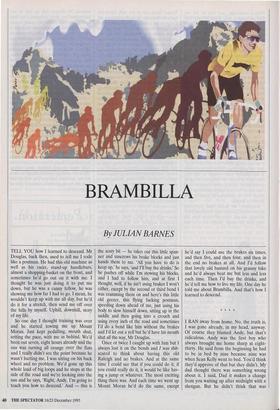
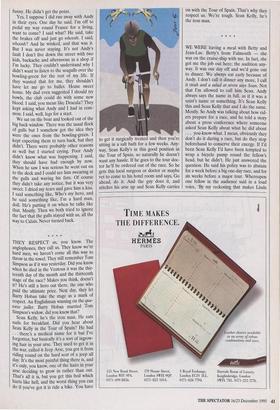
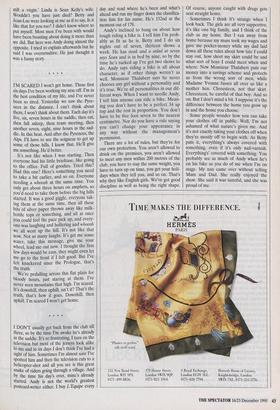
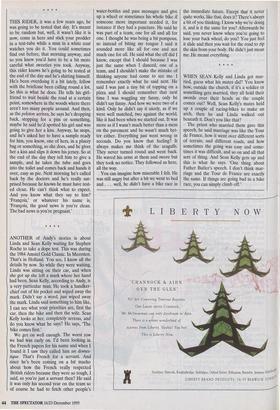
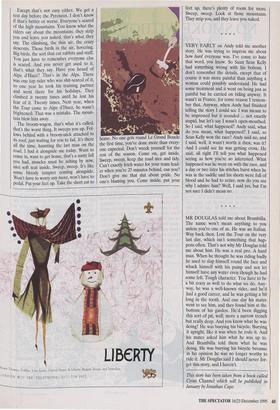








































































































 Previous page
Previous page